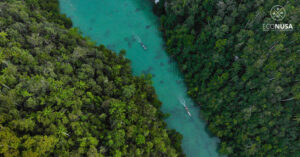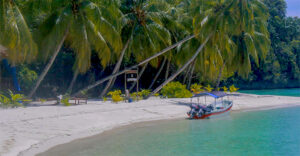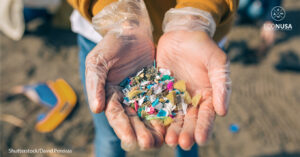
Participation of religious community will give major impact to control global warming. The massive number of community members without social institution will not only play major role in climate crisis impact mitigation but also save the earth. When religious believers community and indigenous community work hand in hand, it will bring a new hope in an endeavor to enhance earth condition.
Indonesia Interfaith Rainforest Initiative (IRI) Director, Hanafi Guciano, said that to conserve nature such as preventing deforestation was a grateful mind to God’s creation. If it is not done, deforestation does not only turn down God’s creation but also bring about humanity crisis.
Read also: Regulation Holding up Tradition Knowledge
“Deforestation has become humanity crisis as it threatens the next generation. This action will bring about many kinds of disasters such as flood, landslide and sea level rise. There are many countries with low coastal lines start being submerged,” said Hanafi in a virtual discussion on “MaCe Papua: Glory of Nature in Faith” on Monday, 21 September 2020.
Hanafi said the action of religious devotees could support the indigenous community struggle for keeping earth harmony for thousands of years. As to him, local wisdom and indigenous community knowledge are the most feasible way to keep nature harmony. Unfortunately, the indigenous community has not got any significant position and recognition.
“Indigenous community is less than 5 percent of the total of earth populations. But, they are the ones who rescue 80 percent of earth biodiversity existing surrounding the indigenous community residences. Regrettably, they are threatened by extractive industry moving into forests. IRI calls the religious leaders to join the government, private sector and civil society to protect forests and move together with indigenous community,” said Hanafi.
Read also: Saka Mese Nusa Reaffirmed at Morekau Village School
The customary people’s endeavor to protect environment has been proven by Chief of Haruku Village Kewang (local attribute of environment defender), Eliza Marten Kissya. Eliza, dubbed Opa Eli, has preserved the ecology of Haruku Village, Haruku District, in Central Maluku Regency, Maluku Province, for 42 years. As to Opa Eli, forests and ocean are like deposit that should be given back to the next generation.
Opa Eli’s daily routine is done by seeding and planting mangrove, educating environmental defender cadres, breeding maleo bird, saving starfish turtles, and conserving coral. He also manages sea traditional event (sasi) opening and closing.
“If we are not wise to manage natural resources, perhaps it will only make one generation left in the village before going away because our island is too small. There is only small number of natural resources and thus it should be managed using sasi as customary rule. Sasi is a local ban for taking resources before the it is allowed,” said Opa Eli.
Read also: Malaumkarta Requires Next Generation to Revive Tradition
The collaboration among religious devotees and indigenous community could be seen in Papua Province. The Indonesian Christian Church (GKI) of Pengharapan Jayapura jointly with the indigenous community made some environmental analyses and submitted the documents to the government as policy recommendation.
In commemoration of the 109th anniversary of Jayapura City and evangelization at Tanah Tabi, GKI Pengharapan Jayapura issued Environment Status in Jayapura City document and handed over 12 recommendations as academic paper of Regional Draft Bill on Protection of Youtefa Bay Tourism Park.
With the supports of 5,513 followers, GKI Pengharapan Jayapura also conducted monitoring and advocacy for forests revegetation at Dafonsoro slope, a buffer zone of Cycloops Nature Preserve.
“We hope there is change of local community behavior to eliminate forests fire. With the advocacy we try to promote environmental education to local figures, religious leaders and village administration so they can speak to the local community for ecological awareness,” said Peter Wamea, GKI Pengharapan Jayapura’s Chairman of Peace and Creation Well-being Commission (KPKC).
Editor: Leo Wahyudi




